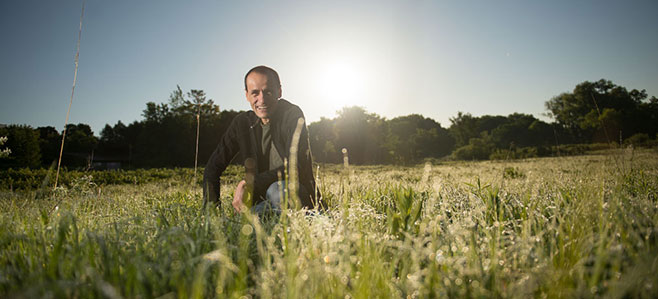
At the Wisconsin Energy Institute (WEI), researchers like Claudio Gratton are looking for ways to increase the nation’s bioenergy supply while preserving ecosystems and maintaining biodiversity. Gratton, right, is especially interested in how growing biofuels like switchgrass, harm or benefit insects such as bees and lady beetles, which, he says, provide landscape services like pest management and pollination.
The new building brings many of the Institute’s100 affiliated faculty members together in a facility designed to encourage collaboration. The state has approved Phase 2, which will add more laboratories that will be built with private funds.
Lady beetles and energy to power your car or your lights may not seem as if they belong in the same sentence until you visit Professor Claudio Gratton, an entomologist working in the Wisconsin Energy Institute (WEI) at the University of Wisconsin-Madison.
Insects and energy, you quickly learn, intersect when crops such as switchgrass are grown for fuel. “When you think about growing energy, you’ve got to put it somewhere,” Gratton said. “If we change the landscapes, what is the impact on insects and pollination and pest suppression?”
Gratton joins scientists from chemistry, engineering and biological research in the first phase of the WEI building, which opened in April. “The neat thing is that if you look at anything in my past, there’s nothing that would say I’m an energy researcher,” Gratton said.
Gratton’s research team considers the impact of bioenergy crops on insects and, by extension, birds, wildlife and humans. “Insects are our allies,” he said, calling them ecosystem engineers that control harmful insects, pollinate crops and decompose waste. “When they’re not there, we notice.”
The choice to grow vast fields of corn and soybe ans using herbicides and insecticides, for example, has disrupted natural systems and eliminated biodiversity. The monocultures cause a decline in lady beetles that eat aphids and other pests. At WEI, researchers look at a crop’s benefit or detriment to the entire ecosystem instead of just measuring its value by how much energy it can produce. Crossing traditional research boundaries from entomology to energy storage systems, WEI faculty are making game-changing discoveries to produce clean energy and conserve limited resources.
“If we do it right,” Gratton said of WEI’s research, “and select the right plants in the right place and manage them correctly, we have the potential for a crop that can be sold for our energy and supports wildlife.”
[ar12]
